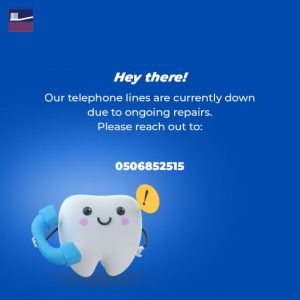
TMJ disorder is a relatively common condition with a prevalence between 5 to 12%. Unlike other conditions that cause chronic pain, TMJ disorders tend to affect younger people more than the elderly. Knowing more about the disease is crucial to ensure that you receive help at the earliest possible time from our dental clinic in Abu Dhabi before your quality of life is affected. We will examine this disorder in-depth and reveal the effective treatments that can help you recover.
What is TMJ disorder?
It is a condition that causes pain in the temporomandibular joint and the muscles that regulate jaw movement, hence the name TMJ disorder. The TMJ is found on both sides of the head and connects the jawbone to the skull, acting as a sliding hinge. It allows you to both eat and speak by enabling you to open and close your jaw. If you have the disorder, any actions that require jaw movement will become difficult due to intense pain.
What are the symptoms?
- Pain within and around the ear
- Jaw pain or tenderness
- Persistent pain in one or both of the temporomandibular joints
- Pain in the facial muscles
- Jaw locking that makes it challenging to close or open the mouth
- Trouble with chewing food or pain felt when chewing
What are the causes?
It is hard to determine the exact cause of a TMJ disorder as the pain can be due to several factors.
Genetics
A family history of TMJ disorder could imply genetics as a cause. There is also increasing scientific evidence that genes may be playing a role in the pathology of TMDs. However, the underlying mechanism is still unknown.
Arthritis
While Arthritis typically affects wrists, hands and knees, it can also cause inflammation in the TMJ resulting in chronic pain. This occurs due to the disease damaging cartilage in this region. It has to be noted that TMJ disorders caused by Arthritis usually only happen during the latter course of the disease.
Jaw injury
Injuries to the jaw region could lead to the development of TMJ disorders. A significant impact such as a strong blow can damage the bone and cause chronic pain. In some instances, they could displace the small shock-absorbing disk located in the joint that allows smooth movement, resulting in significant pain when you move the jaw.
Bruxism
Some people could develop TMJ disorder due to habitually clenching or grinding their teeth.
What is the treatment available?
Medication
Usually, the pain associated with the disorder is temporary and can be managed through self-care and nonsurgical treatments. If over the counter medication such as aspirin is insufficient, our dentists in Abu Dhabi would give you stronger pain-relievers and anti-inflammatory medicine. Low doses of amitriptyline, an antidepressant, can also be provided for bruxism control and pain relief.
Therapies
If medication does not help or you wish to use it as a last resort, therapy could provide some relief. Oral splints or mouth guards are effective in reducing jaw pain. Physical therapy to stretch and strengthen jaw muscles could also effectively manage TMJ disorders. Counselling and psychotherapy could help you deal with any mental health factors that could be influencing behaviours leading to TMJ disorders. Bruxism, for many, is a stress-related response, so dealing with what is causing the stress is the best way to stop the behaviour.
Surgery
If the above fails to give effective results, surgery could be used as a last resort. It includes arthrocentesis, which involves inserting tiny needles into the joint to remove any debris or parts causing inflammation. TMJ arthroscopy can also be an effective way to treat the disorder. However, if the pain still fails to subside or the cause is a structural problem with the joint, we recommend open-joint surgery to repair or replace the part.
While you can sometimes manage TMJ disorder without major treatment, it is still crucial to visit the dentist for a thorough probing and consultation if you detect any symptoms. For more information on the disease or to speak to our dentist, contact us at American Dental Clinic.





